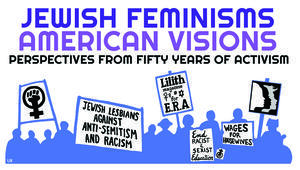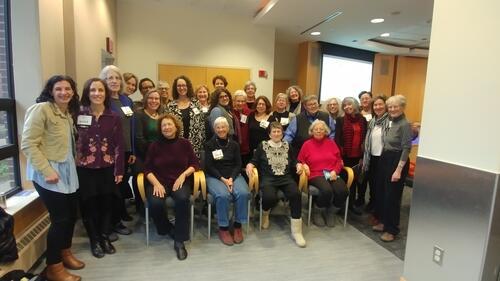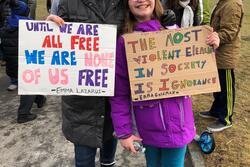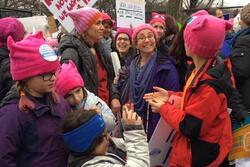Seven Lessons from our Feminist Foremothers
Last week, I had the privilege of participating in an extraordinary conference on “Jewish Feminisms/American Visions: Perspectives from Fifty Years of Activism.” Hosted by the University of Michigan’s Jewish Communal Leadership Program (which is directed by JWA’s own co-chair Karla Goldman) in partnership with JWA, and in response to Joyce Antler’s groundbreaking book Jewish Radical Feminism, this gathering brought together generations of Jewish feminists who have shaped American feminisms, examining their work and its powerful impact on Jewish communities, culture, and politics.
It’s hard to describe the intensity and richness of the presentations and conversations, which moved seamlessly between personal reflections on biography and identity to heady considerations of politics and social change. I left Ann Arbor feeling saturated and stimulated, my mind and heart bursting with stories and insights gleaned from each session. There were so many lessons on offer—here are seven I’ve distilled so far.
1. Put love at the center.
One of the lessons we can learn from second wave feminism is the danger of “trashing”—taking down those in our movement with whom we disagree or come into conflict. So many feminist communities were destroyed by trashing. We’re strongest and most effective when we put love at the center.
2. Don’t wait to figure it all out before getting started.
As she described the beginning of Ezrat Nashim, an early Jewish feminist organization that focused on equal access, Martha Ackelsberg admitted that even as the founders were choosing their focus, they knew it was insufficient. “We knew it wasn’t enough, and we knew it wasn’t all that we wanted, but we didn’t know what we wanted!” Martha explained. “We realized that Judaism had been created for men by men. We knew a Judaism that included women’s perspectives would be very different, but we didn’t know what it would look like, and we couldn’t wait to figure it out before we took action. So we focused on equal access.” It is tempting to hesitate and delay action until we have it all figured out, but the example of Ezrat Nashim teaches us to move forward anyway.
3. Feel the fear and do it anyway.
One of the most poignant moments of the conference occurred when a student asked the panel of feminist pioneers (including Heather Booth, Vivian Rothstein, and Miriam Hawley) whether they had ever experienced fear and self-doubt—and every single one said “Yes, absolutely.” It was both comforting and sobering to know that even those who seem fearless grapple with feelings of inadequacy. Their message, however, was clear: Fear is normal and universal, but it should not hold you back. Or, as Letty Cottin Pogrebin put it: “Feel the fear and do it anyway.”
4. Create and recreate, at once and again.
So many different organizations, collectives, and groups—constantly forming, reforming, failing, and reimagining themselves—comprised the women’s movement of the 1960s and 70s. Feminism’s richness stemmed from the multiplicity of approaches and the ongoing creativity. There are so many paths to social change, and so many different people who are part of our movements, and we need them all. And of course that creativity didn’t end in the 1970s. In fact, one of the most inspiring aspects of the conference was witnessing how women now in their 70s and 80s continue to discover and reinvent themselves.
5. It’s never too late to learn.
One of my favorite stories came from someone who was unable to attend the conference (but shared written remarks). In the late 1960s, Marilyn Webb withdrew from her graduate program at the University of Chicago after experiencing sexual harassment and assault at the hands of her advisors. In the wake of #MeToo, at age 75, she returned to the University and explained she had been robbed of the opportunity to earn her PhD. She is currently finishing her dissertation! I love that Marilyn—a feminist pioneer—was inspired by a new generation of feminist activism to claim her right to return to school and complete her program.
6. Visibility matters.
At JWA, we often say “if you can see it, you can be it.” In other words, visibility matters. The importance of visibility—of seeing yourself represented and reflected in the experience of others—surfaced in every session, but my favorite example came from Judith Plaskow. Voice shaking with emotion, Judith told the story of hearing Naomi Weisstein speak at a conference in 1970, in which Naomi described her experiences as a woman in graduate school, dismissed and discouraged from taking herself and her ambitions seriously. Naomi’s words resonated so deeply with Judith’s own experiences that she still can’t tell this story without crying, nearly 50 years later. Judith’s tears revealed the lasting impact of having your experiences affirmed—and should remind us to continue to push for greater diversity within our communities and our leadership.
7. Don’t go it alone.
If one word came up more than any other during the conference, it was “collective.” Nearly every person spoke about the importance of the collective, of community, of what is made possible by working in partnership with others. This lesson is intimately related to the first—we must put love at the center because we need to ground all of our work in relationships. It’s hard to make change, we live in difficult times, and we need each other—for support, challenge, companionship, learning, inspiration, and joy—if we are going to create a better world.









